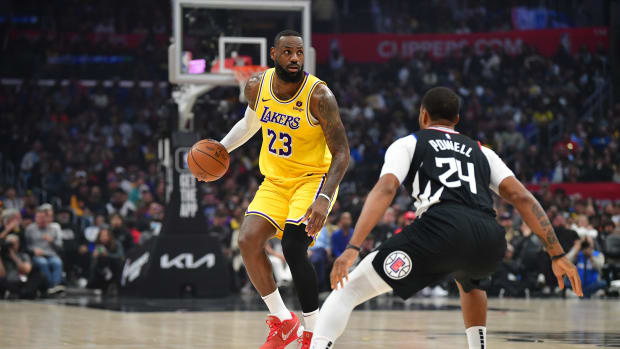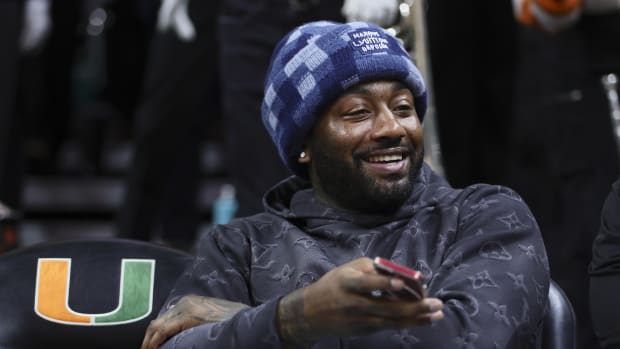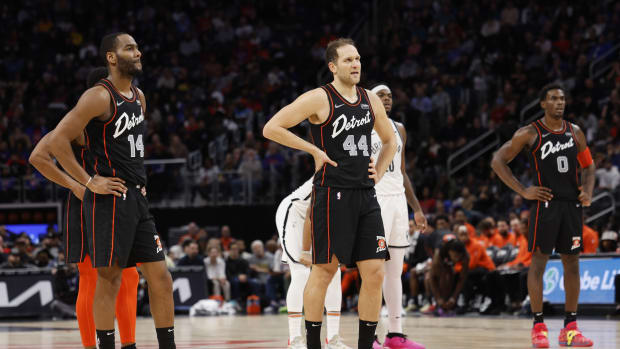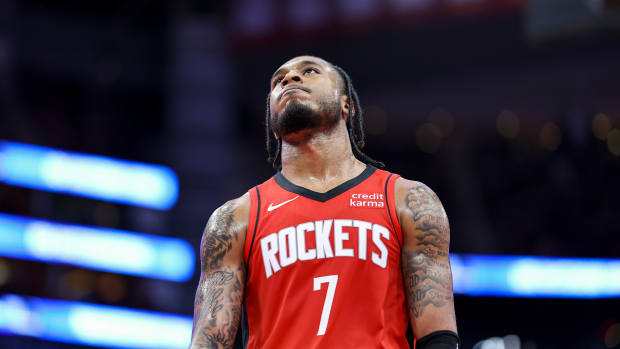Winners and Losers: Kawhi Leonard, Paul George and NBA Free Agency's Second Act
NBA free agency took a wild turn early Saturday morning when Kawhi Leonard decided to sign with the Clippers, in conjunction with Paul George, who requested a trade out of Oklahoma City to join Kawhi in Los Angeles. The coordinated efforts of Leonard and George shifted the landscape of the entire NBA, furthering a schism between the East and West, while also severely altering the future plans of several franchises. With so many wide-ranging consequences coming from the Kawhi and PG transactions, now seems as good a time as any for another round of winners and losers.
Winner: Tampering
For basically an entire season, the Clippers did everything short of tampering with Kawhi Leonard. They fired Bruce Bowen from his TV analyst role after he criticized Leonard publicly. They sent staffers to Raptors game for an entire season, not really to scout Kawhi, but more to constantly remind him of the team’s presence, according to ESPN’s Brian Windhorst. The Clippers made their Leonard intentions clear, and while people on the outside can’t really be sure how much that impacted Kawhi’s final decision, he’s now a Los Angeles Clipper.
Of course, Leonard didn’t join the team alone. He did so with George, who he recruited fiercely himself. According to ESPN’s Ramona Shelburne, Leonard met with PG the same day of his meeting with the Lakers. How Kawhi was able to orchestrate the trade of an MVP finalist with two years left on his contract will, for me, remain one of the most fascinating NBA stories of this era. Leonard basically had no regard for the fact that barely one year ago George signed a long-term deal with the Thunder. Kawhi was apparently confident he could force OKC’s hand, and he was right.
Both gambits, which occurred when the object of affection was under contract, paid off. The Clippers don’t bother me, because the Raptors still won a championship, and at no point during the season did Leonard seem distracted. And if you’re upset that Leonard and George discussed playing together while PG was still under contract, ask yourself if you’ve ever been upset when a team discussed trading a player with multiple years left on his contract—say DeMar DeRozan—without telling him about it first. Some fans of the Raptors and Thunder may not feel great about how this new Clippers squad was formed, but it reflects the reality of doing business in the modern NBA.
Loser: One-Year Gambles
When Anthony Davis made his trade request, there was some chatter amongst basketball writers if an unexpected team would take a chance on him. With only one year left on Davis’s contract and his explicit desire to play for the Lakers, it would have been risky for say, the Blazers to swing big for Davis. However, the reason Portland (or any other team) would have been emboldened to take such a chance was because of the success OKC and Toronto had with George and Leonard, respectively. Will this summer change the calculus of superstar trades moving forward?
The Thunder were applauded for taking a chance on George, though at the time, they seemed to have acquired him for a steal. PG re-signing in OKC was a coup for the organization, and ironically was probably one of the reasons the Raptors felt comfortable trading for Kawhi. But now both teams have lost those players, and both have complicated rebuilds as a result.
Toronto at least has a championship to show for Kawhi, which is the point of all of this, and is no small consolation. But what do the Raptors do now? Do they sell off veterans and focus on the young core? Do they make another run with the leftovers? What if Toronto ends up back where it was before Kawhi—a consistent playoff team with a hard ceiling?
The Thunder face probably more difficult questions. Do they trade Russell Westbrook and start from scratch? Do they keep Westbrook and try to find the next Paul George with their newfound assets? What does it mean that both George and Kevin Durant departed this franchise?
I certainly don’t think either Toronto or Oklahoma City regret acquiring Leonard or George in the slightest. Both were smart moves, and both paid dividends for some time, and obviously in the case of the Raptors resulted in the ultimate goal of the entire NBA exercise. But I do wonder if in the future, other GMs see the resulting complications of trading for a star who isn’t initially interested in playing for their franchise, and instead take a more conservative path.
Winner: Asset Culture
The Thunder traded Paul George, a perennial Defensive Player of the Year candidate, a 2019 MVP Finalist, and top-10 player in the NBA for a point guard who finished sixth in Rookie of the Year voting, an expiring contract and five first-round picks. Shai Gilgeous-Alexander may turn out to be a franchise guard, but in a best-case scenario, he turns out to become the kind of player George already is, and that’s no guarantee. Realistically, it’s those first-round picks that are the important part of this trade, and how you view them is basically a Rorschach test for how you consume the NBA.
For me, the competitive aspect of this trade bothers me. By trading George to the Clippers, the Thunder enabled them to also sign Kawhi Leonard. If I’m OKC, I don’t make that move for that reason alone. Maybe Sam Presti was truly worried Kawhi would turn around and sign with the Lakers if he couldn’t get George on the Clips, but I’d rather force someone like Kawhi to go with his second choice than give him everything he wants.
Presti extracted a haul from the Clippers, but it concerns me he reportedly only really negotiated with two teams. The market for someone like George—who has two years left on his contract!—could have been robust. We’ll never really know what kind of market OKC could have created for PG. What if the Pelicans turned around and threw a bunch of players at the Thunder to pair George with Zion? What if OKC could have brought back its own version of Victor Oladipo and Domantas Sabonis?
Superstar trades are tricky, and the team losing one practically never gets an equal return. But I do think the draft pick fetishization has gotten out of hand. The Thunder are basically betting on the Clippers, a smartly managed team that just put itself in position to acquire two top-seven players, to eventually fall apart so they are forced to hand over good draft picks. OKC has basically traded George for whole lot of chocolate bars, hoping at least one of them contains a golden ticket. There was going to be risk in this trade no matter what—George wasn’t going to return anyone near his caliber—but from what’s been reported, I don’t know if OKC did enough to try to bring back an All-Star to join Westbrook in a wide-open West.
There are so many layers here. Perhaps the Thunder felt burned from the fact George requested a trade so soon after signing his contract that they didn’t want to try out the star route again. And as both the Clippers and Lakers have shown, picks can be valuable whenever a disgruntled star hits the market.
But don’t forget about the Celtics. They were the last team to amass a treasure trove of picks in the hopes of putting together a dynasty. Boston has Jayson Tatum and Jaylen Brown to show for the Nets trade, but nothing else. The picks Danny Ainge hoped to move for someone like AD had to become actual players in this most recent draft, and now those assets are significantly less valuable than when they were theoretical.
I don’t pretend to know the best way to build a team in the NBA, and Presti is literally devoting his life to weighing the risks and rewards of trades like this one. I do wonder how much longer first-round picks will be the most important currency in these trades, or whether they’ll ultimately be viewed as a way for teams to kick the can down the road.
Loser: Sam Presti and Russell Westbrook
Presti has traded away James Harden, Serge Ibaka and Paul George, and had to see Kevin Durant leave for the team that beat his Thunder in that year’s playoffs. I don’t think Presti is at fault for most of this. Durant and George wanted out. Ibaka actually turned into two pieces that made a lot of sense at the time. Harden, in my understanding, was more of a result of ownership’s hesitance at paying the luxury tax. But damn, Presti has to be asking if OKC’s headquarters are built on a sacred burial ground or something.
Meanwhile, Westbrook has now seen a second running mate choose to play with another superstar instead of him. I don’t imagine this will change Russ. If anything, it will embolden him to return to the solo act he employed during his MVP season. It’s honestly all a shame, because there’s a version of Westbrook’s career in which he excises the worst parts of his game—like, his three-point shooting—and his legacy is probably much different as a result.
Winner: Big-Market Exceptionalism
The Raptors won a championship with Kawhi Leonard. He left for Los Angeles. Paul George signed a four-year contract with the Thunder. He left for Los Angeles. The Celtics traded for Kyrie Irving and surrounded him with young talent and capable veterans like Gordon Hayward and Al Horford. He left for Brooklyn. Kevin Durant went to three Finals in three seasons with the Warriors. He left for Brooklyn. In the cases of Irving, Durant, and George, they didn’t even go through the process of taking several meetings and deciding after days of deliberation. They circled the teams they were interested and went there, seemingly with less regard for the infrastructure in place, and more for the blank canvases they presented for their personal interests.
Loser: Lakers Twitter
Lots of Lakers photoshops will never see the light of day after Kawhi chose the Clippers. LeBron and AD have a tall task ahead of them now. They aren’t the best team in their own building, and because the Lakers waited for Kawhi, they are signing free agents off the scrap heap. Danny Green was a nice pickup, but the rest of the rotation is confusing. Is Rajon Rondo or Quinn Cook the starting point guard, and is either one of them (at this point in their career) capable of starting for a championship team? (Rondo and Bron were awful together last season.) Can LeBron, AD, and Kyle Kuzma play together? Who is going to guard opposing small forwards? The Lakers took a big—and completely understandable—risk in waiting for Leonard to make his decision. They were maybe a Paul George trade request away from pulling this off. But the Lakers are now feeling the pinch worse than anyone outside of Toronto as a result of Kawhi’s choice.




































